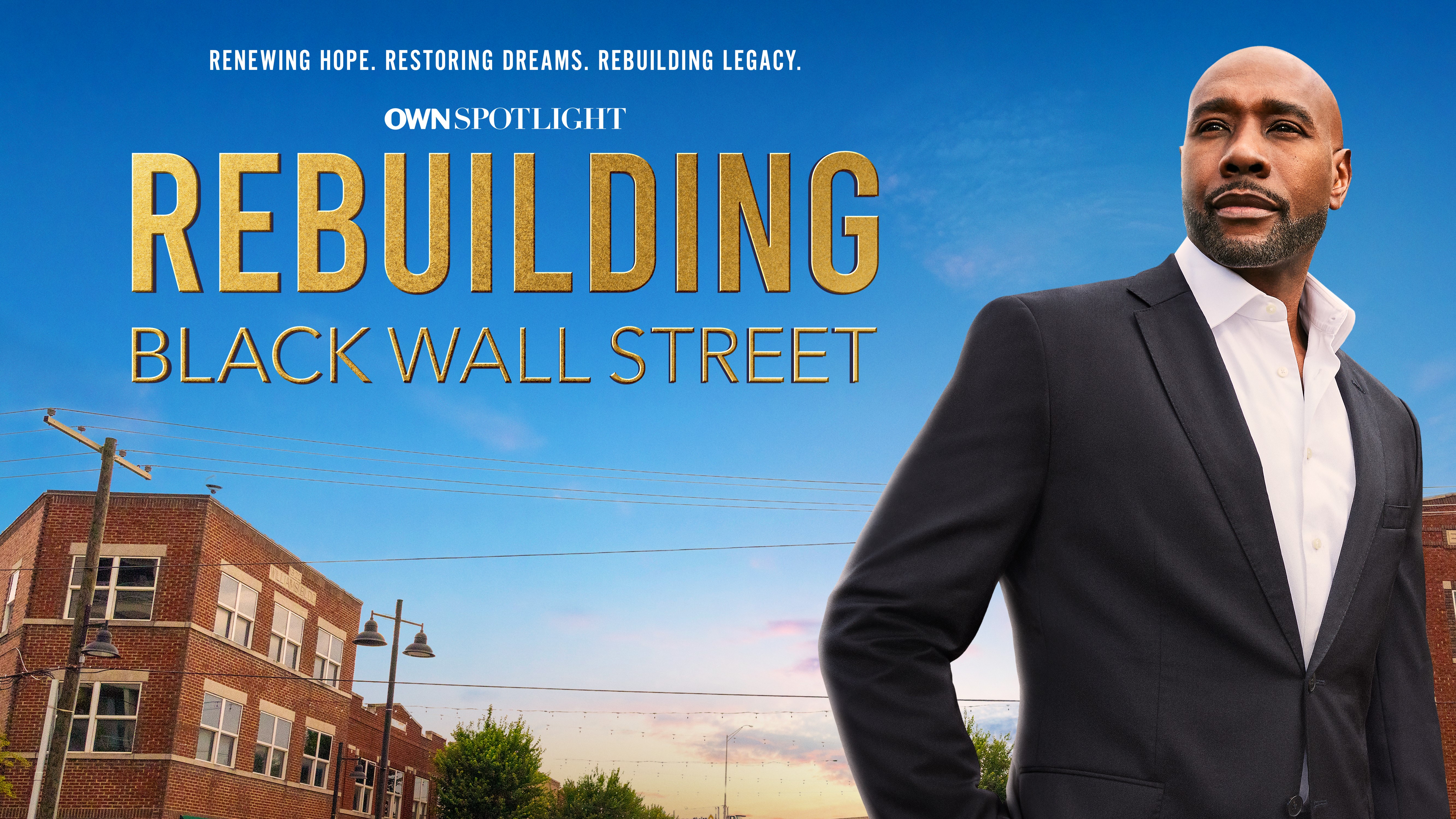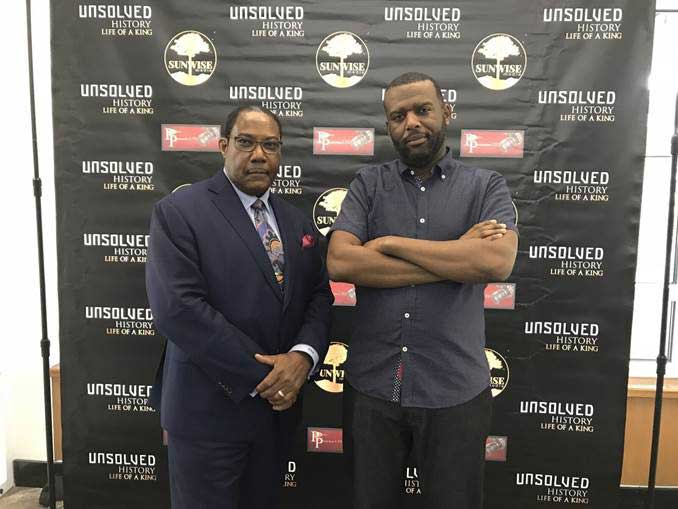‘Rebuilding Black Wall Street’ Validates Mission of Black-Owned Producer Sunwise Media
Series highlights efforts by descendants of 1921 Tulsa race massacre

The smarter way to stay on top of broadcasting and cable industry. Sign up below
You are now subscribed
Your newsletter sign-up was successful
Seeing their docuseries Rebuilding Black Wall Street appear on the Oprah Winfrey Network starting September 29 and stream on Max will validate the “do good” mission of the founders of Sunwise Media, the Black-owned production company behind the show.
Founded by Ri-Karlo Handy and Elverage Allen in 2017, Sunwise’s mission has been to create entertainment that inspires and compels social and cultural change. Getting a series on OWN, especially one about building minority-owned businesses, is an achievement that pays off years of hope and effort.
“We made a conscious choice as a studio and as a company not to chase things. We want to develop things that were not only brand safe, but also that were additive and helpful to the community,” Handy told Broadcasting+Cable.
Also Read: Hearst, Sunwise Media Make Plans To Reimagine Saturday Morning TV
“Sometimes that comes across as earnest and maybe not as exciting. But hey, the most popular things in our world are earnest,” Handy said. “We love superheroes, we love sports heroes and we love people who are doing things that seem impossible, and we want to see how they achieve them.
“That is really the crux of where this fits in. These are local hero stories we’re telling.”
Black Wall Street, the affluent Greenwood business district in Tulsa, Oklahoma, destroyed by racial violence in 1921, has been the subject of numerous television projects, including ones from Spike Lee and LeBron James.
The smarter way to stay on top of broadcasting and cable industry. Sign up below
Handy and Allen knew the story but got deeply involved through work it did on a commercial project for the Greenwood Bank in Tulsa that featured actor Jesse Williams.

“I think ours was unique because it was content around a business that was actually trying to give back to the community,” Handy said.
After meeting descendants of the people whose homes and businesses were destroyed and hearing the stories about what was happening now, Handy decided to come up with an idea for a show that would focus on the people trying to rebuild the business district.
“You can’t do that without telling the history, but I just felt like everyone was doing documentaries,“ he said. “I wanted to do something different and something that would be repeatable.”
Hosted by Morris Chestnut, each episode of Rebuilding Black Wall Street tells the story of another business being created and the people behind it.
The rebuilding projects are led by designers Jon Pierre and Mary Tjon Joe-Pin.
One of the stories revolves around Kevin Johnson, the former NBA star and mayor of Sacramento, California, whose grandparents lived in Tulsa. Johnson opened a branch of his Fixins Soul Kitchen restaurant chain in June and it serves some dishes based on his grandmother’s recipes.
“We have to strike a balance between all those terrible things that happened and the rebirth that’s happening now,” Allen, Sunwise’s sales chief, said. “We want to be true to the history but we also want to make sure that the advertisers feel like they're being part of an aspirational story.”
Handy thinks there are more stories to tell, not only in Tulsa, but in other cities. “There were several Black Wall Streets that all experienced these horrific atrocities over a long span, primarily from the late 1900s through the 1940s and ’50s when things started to shift away from the Jim Crow laws.”
But first things first. Getting the show greenlighted was a long process. Of course, there is a direct connection to Oprah Winfrey herself. Handy was working on a mental health project with Winfrey and met with her the day after the Super Bowl in 2021.
“The meeting was about another project and that project went to a different company,“ Handy recalled. “But the meeting went well and the consensus was, ‘Let’s do something.’ We got a development deal within 24 hours.”
As part of the development deal, Sunwise pitched a number of projects. “This show happens because of [OWN president] Tina Perry,” Handy said. “We’ve known her since before she was president of OWN and she genuinely believed in our company.”
“Inclusion in the media has never been more vital, so having a Black-owned production company tell this story was very important to us,” said Drew Tappon, head of unscripted development, programming and specials at OWN.
“The most authentic, unscripted projects focus on situations that are happening whether cameras are in place or not,” Tappon said. “Sunwise is on the ground, capturing real-life efforts of a heroic community.”
The project also got crucial boosts from GroupM’s Diverse Voices Accelerator, an initiative that supports creators, writers, producers, directors and studios from traditionally underrepresented groups in entertainment, and from Sheereen Russell, executive VP, ad sales and inclusive content partnerships at Warner Bros. Discovery, OWN’s parent company.
Domino’s is one of the GroupM clients sponsoring the series.
In the recent upfront market, there was much more demand for shows that offered diversity, equity and inclusion opportunities, Jon Steinlauf, chief U.S. ad sales officer at Warner Bros. Discovery, said at B+C’s Advanced Advertising Summit this month.
“We were able to work with our channel, Oprah Winfrey Network, and now we're gonna deliver [Rebuilding Black Wall Street] through a minority-owned production company on the OWN linear platform, as well as on other platforms,” Steinlauf said. “I'm very proud of the fact that as a company, we have those values and we work with our advertisers who share those values to try to bring stories like that to life that otherwise may not have been seen.”
Karra Duncan, a television producer who has been a friend of Handy’s for years and is a descendant of Tulsa massacre victims, played another key role.
“Because of her, I was fully tapped into the community,” Handy said. “It’s a very tight-knit community. And to do any show like this, where you’re getting into something that is so important to people, you’ve got to make sure that they know you’re going to handle it with care.”
Handy and Duncan are executive producers of the show, along with Chestnut.
The show could be a turning point for Sunwise.
“I would describe it as our first commissioned project where we were able to genuinely partner with the network on every aspect of our business,” Handy said, from content development and content production to brand integration.” I felt like it was the first time where our model for Sunwise really started to come together.”
While Warner Bros. Discovery sold sponsorships and commercials in the show, Sunwise was able to sell product integrations.
The timing was off, and by the time Sunwise was able to make its pitch, most advertisers had already spent their upfront budgets, Allen said.
“It's got GroupM behind it and Warner Bros. Discovery behind it,“ Allen said. “We’re very hopeful and optimistic that we can get brands involved if there’s a season two.”
While diversity, equity and inclusion has been a hot topic, the challenging times in the TV business have led some companies to outsource their DEI efforts, Handy said.
“How many checks are being written to companies like Sunwise Media, you know, particularly for this type of content,” he said.
But Sunwise remains optimistic.
“This year showed me that there's a big shift in our industry,“ Handy said. “I think we're on the cusp of shows and content being financed more directly by brands. And I feel like Sunwise is in a position to work with other networks and other brands and other agencies in the same way because we've been working the kinks out of how that could look from a third-party producer studio.
“If brands or networks want to thoughtfully get involved I think our show and the way we went about it could be a good starting point, because the community is behind it and a community hasn't been behind everything that people have done in Tulsa,” Handy said.
Allen is hopeful that Rebuilding Black Wall Street will generate ratings and earn a second season.
“But if it doesn’t, that’s OK, too, because the story needs to be told,” Allen said. “Hopefully we, along with the network and the sponsors, will get recognition for walking the talk, which you don't see a lot of.”
Jon has been business editor of Broadcasting+Cable since 2010. He focuses on revenue-generating activities, including advertising and distribution, as well as executive intrigue and merger and acquisition activity. Just about any story is fair game, if a dollar sign can make its way into the article. Before B+C, Jon covered the industry for TVWeek, Cable World, Electronic Media, Advertising Age and The New York Post. A native New Yorker, Jon is hiding in plain sight in the suburbs of Chicago.

